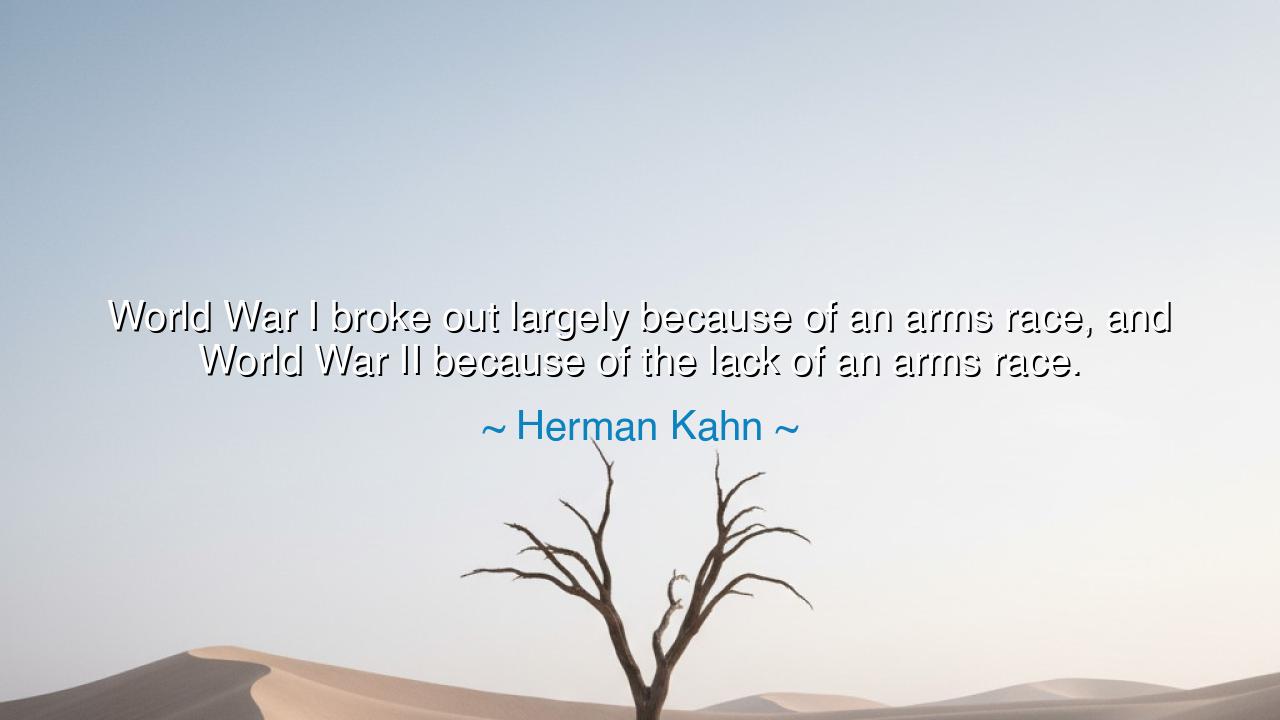
World War I broke out largely because of an arms race, and World
World War I broke out largely because of an arms race, and World War II because of the lack of an arms race.






Hear the paradoxical wisdom of Herman Kahn, strategist of the nuclear age, who declared: “World War I broke out largely because of an arms race, and World War II because of the lack of an arms race.” These words, layered with irony, reveal the strange and perilous balance of power that governs nations. They teach us that war is born not only from the abundance of weapons, but also from their absence—when preparation is lacking, and aggression finds no deterrent to restrain its hand.
The origin of this saying lies in Kahn’s reflections during the Cold War, when humanity lived under the shadow of nuclear annihilation. As a military strategist, he studied the past to understand how future wars might be prevented. In the years before World War I, the great powers of Europe poured their wealth into building fleets, cannons, and armies, each suspicious of the other, each racing to outpace its rivals. This frenzy of armament, combined with alliances and pride, created a tinderbox that exploded in 1914 when a single spark—the assassination at Sarajevo—ignited a conflagration that consumed millions.
By contrast, the road to World War II tells a different story. After the devastation of the first war, Britain, France, and others, weary and impoverished, neglected their militaries. They sought peace in disarmament, hoping goodwill might tame ambition. Yet this very weakness opened the path for Adolf Hitler, who rearmed Germany in defiance of treaties. When he marched into the Rhineland, Austria, and Czechoslovakia, no great power stood ready to oppose him. There was no balance, no deterrent, no arms race to check his advance. Thus, aggression thrived in the void left by disarmament.
The meaning of Kahn’s words is a sobering lesson: peace cannot rest on one principle alone. In one age, excessive weaponry drives nations to war; in another, the lack of weapons invites conquest. Security lies not merely in building arms, nor in dismantling them, but in wisdom—the wisdom to balance power with restraint, preparation with prudence, and vigilance with diplomacy. Without this balance, nations stumble into ruin, whether by reckless pride or by wishful neglect.
Consider the example of the Cold War itself, when Kahn lived. The world possessed enough nuclear fire to destroy itself many times over, yet war between the United States and the Soviet Union never erupted. Why? Because each side’s arsenal deterred the other, creating a balance of terror that, paradoxically, preserved peace. This was the strange fulfillment of Kahn’s teaching: that sometimes, the absence of a race invites aggression, while at other times, the presence of a race restrains it.
Yet this balance is precarious, like a sword suspended by a thread. Too much reliance on weapons, and fear itself may ignite war, as in 1914. Too little reliance, and ambition may sweep unchecked, as in 1939. The challenge of every generation is to walk this narrow path, to prepare for defense without exalting war, to deter aggression without inviting destruction. This is the paradox of power, the eternal riddle of peace.
The lesson for us is thus: peace is not passive, but active. It is not secured by arms alone, nor by disarmament alone, but by vigilance, wisdom, and the courage to confront aggression before it spreads. We must remember that history punishes both arrogance and complacency. The balance of nations, like the balance of the soul, requires constant care, lest pride or neglect tip the scales toward ruin.
Therefore, let Kahn’s words be preserved as both warning and guide. World War I was born of too many weapons; World War II of too few. Let us learn from both. Let us labor for peace through strength tempered by wisdom, through dialogue strengthened by preparation, through courage guided by restraint. For only in this balance can we hope to escape the cycles of destruction and preserve a world where future generations may thrive.






KLLe Thị Khánh Linh
This quote makes me think about how unpredictable history really is. One war caused by over-preparedness, another by under-preparedness — it seems like humanity keeps swinging between extremes. Maybe Kahn’s real point is that peace isn’t found in how many weapons exist, but in how wisely nations manage their power and their pride.
CNChau Ngo
Kahn’s observation feels almost cynical, but it’s hard to dismiss. It suggests that peace is less about moral progress and more about strategic equilibrium. That’s a troubling idea — that humanity’s survival depends on mutual fear. I can’t help but ask: does this mean lasting peace will always be impossible as long as nations define security through superiority?
KLPhung Khanh Lang
What strikes me is how Kahn frames global security as a delicate balance between fear and restraint. Too many weapons lead to provocation, too few lead to vulnerability. It feels like a no-win situation. I wonder if this is still true in today’s nuclear world — is deterrence our only real safeguard, or have we just learned to live with constant tension?
NTNguyen Ngoc Thao
This statement challenges my understanding of history. If World War I came from too much preparation and World War II from too little, then maybe there’s no perfect formula for peace. It makes me think that diplomacy and trust are the missing variables — without them, no amount of weapons or disarmament can guarantee stability.
NTDieu Thuy Nguyen Thi
I find this perspective both thought-provoking and unsettling. Kahn implies that peace can be preserved by preparing for war, which feels paradoxical. It raises an important question: does building more weapons truly prevent war, or does it just make potential conflicts deadlier? Maybe the real danger lies not in arms races themselves, but in the human arrogance that comes with them.